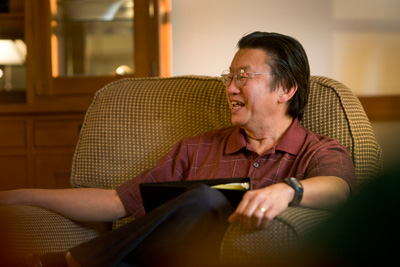Divide and conquer to learn new material, advises professor
By Joyanna Gilmour

To learn, divide new information into small "chunks," relate each chunk to broader concepts, use repetition repeatedly, focus and, finally, counter stress with preparation and relaxation, advised a Cornell neuroscience expert.
"Becoming an academic is about learning how to learn," said Ron Hoy, professor of neurobiology and behavior at Cornell, speaking on "Your Brain on Cornell: What Cognitive Science Tells Us About Learning and Remembering," to a group of about 25 people in Hans Bethe House Aug. 31 for a "Bethe Ansatz" talk.
Hoy stressed that there are things we can do to maximize how our brains learn. He said that research by psychologist Anders Ericsson, an expert on expertise, showed that it takes about "10,000 hours" of focused practice to master a subject. Neuroscientists are beginning to unravel the science behind the 10,000 hours concept by exploring how new information is committed to memory, Hoy said.
Memory, he noted, can be divided into "working" or short-term memory, which is good for "holding, manipulating and updating" information, and "long-term" memory, which permanently stores information for future access. These two types of memory work in tandem, he said, constantly shuffling information to each other.
Long-term memory can be further divided into four domains: autobiographical memory -- each person's "story" about their lives; episodic memory -- the recollection of specific events or episodes in an individual's life; factual memory -- what Hoy terms "facts of the world"; and "muscle" or procedural memory, which is about performing automatic activities that improve with practice, such as riding a bike, typing or playing a sport.
Hoy recounted the story of Jill Price, a woman who could recall the exact events on each day of her life for decades with perfect accuracy, an example of "extraordinary episodic memory." Yet Price was an average, "B" student in college, illustrating that extraordinary function in one domain is not always linked with exceptional ability in other memory domains.
When studying a new subject, know that working memory has limits, Hoy said, noting that the average college student can hold only about four items in working memory at a time; memory overload can result if they are presented with too much new information.
Hoy suggested dividing new information into small "chunks" and attempting to relate each "chunk" of information to broader concepts. This helps the brain move the information from working memory to long-term storage. Repetition is another tool for mastering something new. Finally, "attentional focus ... is really important" for working memory to function properly, according to Hoy.
A barrier to optimal learning is stress, he said, which reduces the amount of information people can hold in their working memory and also distracts focus. The best way to deal with stress is to be as prepared as possible, and then just try to relax, he said.
Hoy emphasized the importance of commitment and motivation to learning and memory, which importantly links the brain and emotions.
Hoy concluded with a personal experiment: "I'm my own guinea pig ... I decided to learn to play piano," said Hoy, who can't read music but is learning piano and music theory using the principles of "chunking" and repetition. It's a "work in progress," he said.
Bethe Ansatz is a weekly lecture at the Hans Bethe House dean's apartment most Wednesdays at 7:15 p.m.
Graduate student Joyanna Gilmour is a writer intern for the Cornell Chronicle.
Media Contact
Get Cornell news delivered right to your inbox.
Subscribe